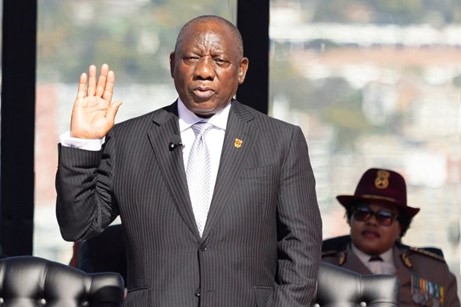President Cyril Ramaphosa was officially sworn in on Wednesday for a second term at the helm of the Union Buildings. After an election in which there was no party that won outright victory, Ramaphosa managed to cobble together a coalition government which he called a Government of National Unity but is more of grand coalition based on a marriage of convenience.
Ramaphosa, whose inauguration took place on Wednesday in Pretoria, now faces the challenge of appointing a cabinet featuring his weakened African National Congress (ANC) Party and coalition partners. Lawmakers voted overwhelmingly to re-elect the 71-year-old last week, after elections in May that produced no outright winner, forcing the ANC to strike deals with five other parties, including the centre-right Democratic Alliance (DA), to form a government of national unity. “The formation of a government of national unity is a moment of profound significance. It is the beginning of a new era,” Ramaphosa said at his inauguration ceremony, led by Chief Justice Raymond Zondo.(Al Jazeera)
Ramaphosa is right about one thing, the GNU will signal a new era. A new era in which one party will no longer dominate South Africa’s politics. The formation of this broad coalition will test Ramaphosa’s diplomatic skills and sense of reason. He will have to balance the demands of the other parties especially the DA against the interest of factions and power brokers with in the ANC. The loss of parliamentary seats by the ANC in the general elections may be a blessing in disguise for the president. He could use this opportunity to purge the party of corrupt individuals with in the ANC ranks.
The ANC, which came to power under Nelson Mandela’s leadership in 1994 after waging a decades-long battle against apartheid, lost its majority for the first time in in 30 years of democracy, gaining just 40 percent of the vote. Its alliance with the DA, the largest opposition party with 22 percent of the vote, has been described by some as a new chapter in the country’s history. While investors have welcomed the inclusion of the DA, focusing on structural reforms and prudent fiscal policies, analysts predict sharp ideological differences between the two could create instability. Just before the election, Ramaphosa signed into law a National Health Insurance bill that the DA says could collapse a creaking health system. It was unclear what would happen to that law under the new government.(Al Jazeera)
The ANC’s loss of power and position of dominance is healthy in a democracy. Even if there is a chance that radical parties have gained more seats in parliament, the price is bitter sweet. It shows our democracy maturing. The ANC under Ramaphosa must now try to manoeuvre between the new parties concerning who obtains which government portfolios. This will be a complex task as the ANC and the DA will determine who is given which ministerial post in the new government given that they have the majority needed between them. However, the ANC passed through controversial laws such as the NHI Bill without consultation or chose to ignore valid advice, means they could now be repealed. Another option would be for the DA to pursue its court case against the NHI bill. The party can have it struck down.
Ramaphosa has also warned in his inauguration speech of the dangers of “toxic cleavages”.
Last week, it agreed to govern with its former bitter rival, the pro-business Democratic Alliance (DA), and four other small parties, in what Ramaphosa has called “a government of National Unity”. Leftwing parties that declined to join have said the government can more accurately be called a grand coalition and that it will reinforce the power of “white monopoly capital”. “We have made great strides in building a new society,” Ramaphosa told an audience that included Nigeria’s president, Bola Tinubu, and King Mswati III of neighbouring Eswatini, in an amphitheatre outside the government’s Union Buildings in Pretoria. “And yet despite this progress our society remains deeply unequal and highly polarised. There are toxic cleavages, often incipient social fragmentation, that can only turn into instability.”(the Guardian)
The president could have been referring to anyone, when he was speaking about toxic cleavages. Most likely he was referring to xenophobic leaning gangs and those who participated in the 2021 looting. The ANC has a golden opportunity to have itself consolidated and reformed under Ramaphosa’s leadership. The ANC will finally face pressure to reform itself to improve its policies and state of conduct. The time has come for a wider participation in democracy by South Africa’s people. There should be more engagement with civil society and those involved in government services such as those involved in the medical expertise. Education should play a key role in this coalitions’ government policy and should be implemented at both basic and tertiary. This should be done across all spheres of society to defeat toxicity.
Article written by:
Yacoob Cassim
Journalist at Radio Al Ansaar






